The Fall of Númenor: Athenians, Atlantis and Adam
Númenor, Westernesse, Land of Sea-Kings and symbolism.
In the early second age, Eärendil, the half-elf son of Tuor and Idril of Gondolin, established the mighty Edain kingdom of Númenor and became its first ruler. Under Eärendil and the kings that followed him, Númenor became an incredibly prosperous nation. They became great warriors and masters of the seas, amassing massive fleets to conquer their foes (perhaps reminiscent of the great Athenian Navies of the Peloponnesian War.) People of Númenor were taller than other men of Arda (6-8 feet), lived much longer lives (200-400 years) and were fair and terrible to look upon like elves. These were all gifts from the Valar as the Edain had fought alongside the Eldar and Noldor in the wars against Morgoth in the first age. They were only forbidden to sail west out of sight of the island, as the Undying Lands lie rather near to Númenor. The population of the island kingdom worshiped the one God, Eru Ilúvatar with fervor. At least for some time.
Using their massive armadas, the Númenóreans sailed to Middle-Earth and built great settlements on the coast, such as the city of Umbar and also in Eriador. For many years the Númenóreans were friendly with the elves, the King Tar-Minastir sending a fleet to the Elven King Gil-galad’s aid. However, with their constant growth in power, Númenor began to stray from the orders of the Valar. Under the rules of kings Tar-Ciryatan and Tar-Atanamir, Númenóreans in Middle-earth began to oppress the men they oversaw, imposing large tributary taxes with cold cruelty. They began to loath the elves for their immortality and sought ways through sorcery to live forever. During the reign of Tar-Ancalimon (S.A. 2221-2386), two parties appeared in Númenor and its provinces. The proud, jealous men who sought eternal life, known as the King’s Men, and the Elf-friends, or Elendili, men loyal to Eru, the Valar and the elves. During Tar-Anaclimon’s reign, the Elendili became a persecuted minority, with the King’s Men becoming the general population. Some of the dark, brooding King’s Men become known as Black Númenóreans, sorcerers and witches of the occult.
Things reached their climax late in the Second Age, when the Dark Lord Sauron declared himself Lord of the earth. The mighty Númenórean King Ar-Pharazôn the golden, the 25th and final King of Númenór, assembled an armada of ships like none ever seen before to meet Sauron’s challenge. With his massive fleet, Ar-Pharazôn landed in Umbar, where Sauron’s armies deserted him in terror.
Instead of fighting back, Sauron begged to be spared and taken back alive to Númenór. In his fair form, Sauron became Pharazôn’s advisor, telling him to abandon worship of Eru and build a temple to Morgoth. This was done, and soon the once faithful land stank of charred human flesh, as human sacrifices were made to the banished dark lord.
As he slowly corrupted the proud king, Sauron lies that there is a way for men to obtain immortality, the Valar simply do not wish for men to know. They must sail their grand fleets across the Sundering Seas to the shores of Valinor, where they will become eternal if they defeat the Valar. Ar-Pharazôn believes Sauron and once more gathers his ships to sail for the Undying Lands. However, as they landed on the white shores to make war, Eru causes the changing of the earth: The separation of Aman from Arda, and the destruction of Númenor. As Az-Pharazôn and his armies touch the land forbidden, the hills and peaks crash down into the sea and their ships are swallowed up by the waves.
Sauron, who is caught up in the fall of the island, loses his body and is never able to take fair form again. Presently, he returns to Mordor, steals the Rings of Power and gives them out to mortals, nine of which are given to men, three being Black Númenóreans.
With the fall of Númenor there is much symbolism. The first that comes to mind is the fall of man. Adam and Eve were given great gifts and were happy, but the sly slithering Satan deceived them that they could attain more through disobedience. They disobey God’s eternal law, which was for their own benefit, and are banished from Eden and its blessings, cursed to wander and gather their own food, while resisting sin and evil. This is similar to the Elendiri fleeing the fall of Númenor, establishing Arnor and Gondor in Middle-earth, but constantly needing to battle Sauron.
Tolkien based the story off the legendary sinking of Atlantis, the great Greek city beneath the waves, but also traditional biblical tales and perhaps even the Ancient Athenians, who used their mighty fleets to conquer much of Greece, but eventually were defeated because of their immense pride.

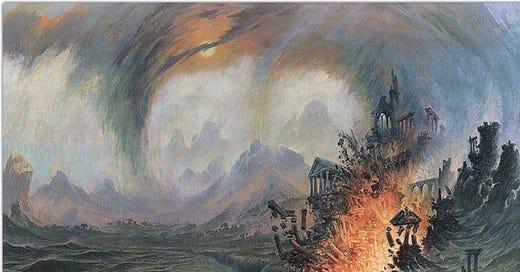




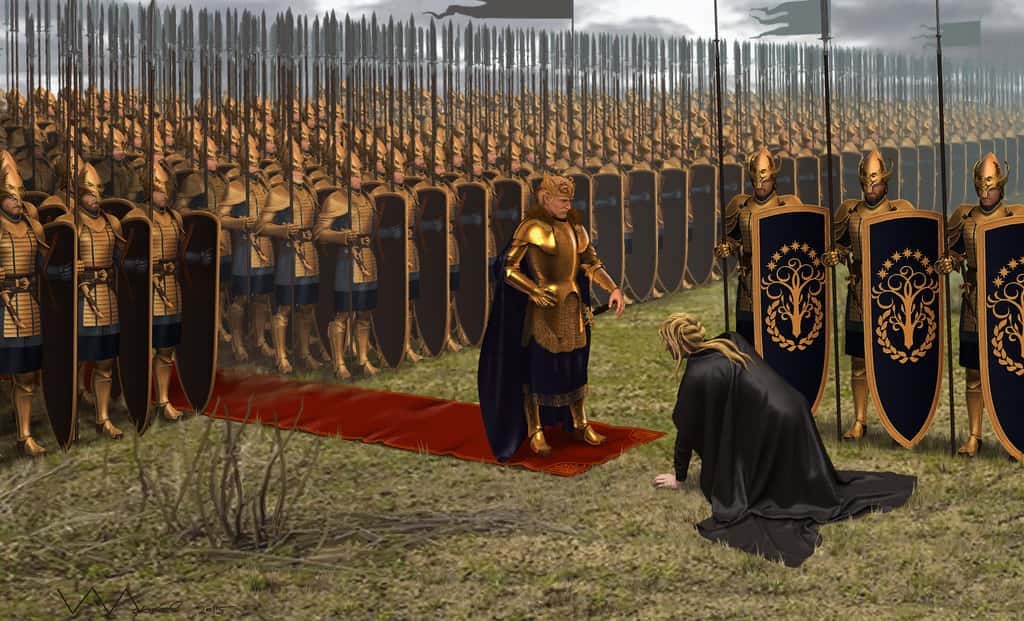
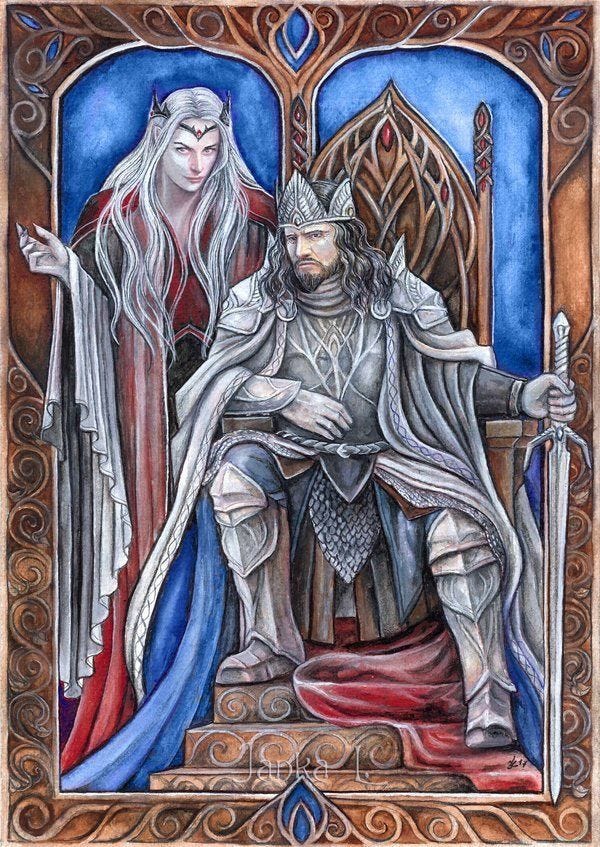
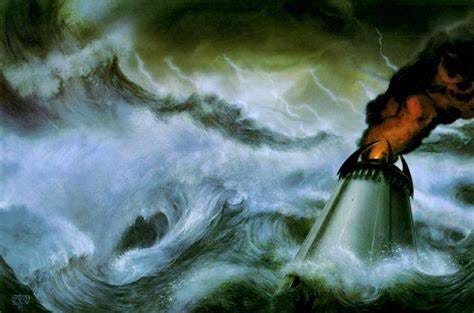
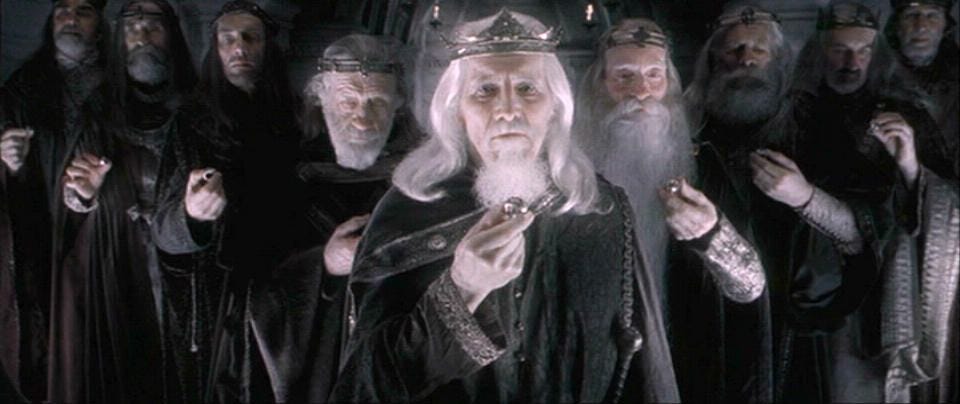
Very interesting. The symbolism of Sauron telling men that they can attain eternal life but the Valar don't want them to know in relation to the fall of man is tremendously interesting. Its too bad The Rings of Power series (which is remotely interesting at best) missed this fact.